The politics of Ukraine take place in a framework of a semi-presidential republic and a multi-party system. A Cabinet of Ministers exercises executive power. Legislative power is vested in Ukraine's parliament, the Verkhovna Rada.
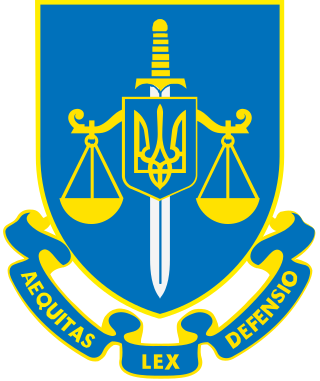
The prosecutor general of Ukraine heads the system of official prosecution in courts known as the Office of the Prosecutor General. The prosecutor general is appointed and dismissed by the president with consent of the Verkhovna Rada. The prosecutor serves a term of office of six years and may be forced to resign by a vote of no confidence in parliament. The current prosecutor general, since 27 July 2022, is Andriy Kostin.
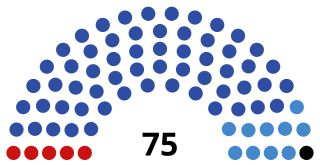
The State Council of Crimea is the parliament of the Russia-administered Republic of Crimea. It claims to be a continuation of the 'Supreme Council of Crimea' following a vote by the Ukrainian parliament to dissolve the Supreme Council of Crimea. The Parliament is housed in the Parliament building in the centre of Simferopol.

Viktor Tarasovych Plakida is a Ukrainian politician and businessman. Plakida served as the Prime Minister of Crimea, an autonomous region in southern Ukraine, from 2006 to 2010. He was the Representatives of the President of Ukraine in Crimea.
The politics of Crimea today is that of the Republic of Crimea on one hand, and that of the federal city of Sevastopol on the other, within the context of the largely unrecognised annexation of Crimea by the Russian Federation in March 2014.
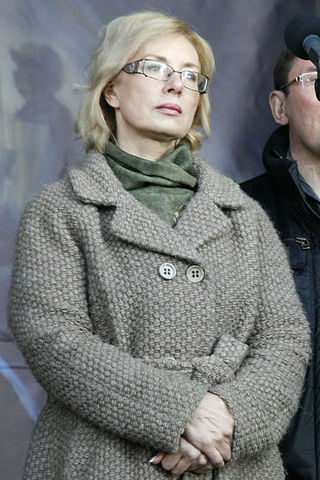
Liudmyla Leontiivna Denisova is a Ukrainian politician. After twice serving as Minister of Social Policy of Ukraine, Denisova worked as Ombudsman for Human Rights in Ukraine from March 2018 to May 2022.

The Council of Ministers of the Autonomous Republic of Crimea, briefly SovMin, is the executive branch of government of the Autonomous Republic of Crimea, a republic within southern Ukraine that is currently suspended due to Russian occupation of the Crimean Peninsula since February 27, 2014. The Council of Ministers derived its authority from the Constitution and laws of Ukraine and normative acts of the Verkhovna Rada of Crimea which bring them into its competency.

Anatolii Volodymyrovych Mohyliov is a Ukrainian politician. He served as the prime minister of Crimea and the Ukrainian minister of Internal Affairs.
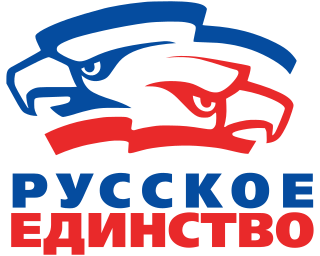
Russian Unity was a political party in Crimea, registered in October 2008. A Kyiv Court banned the party "from activity on the territory of Ukraine" on 30 April 2014. Party leader Sergey Aksyonov was instrumental in making possible the annexation of Crimea by the Russian Federation. The party was based in Crimea, which has a Russian-speaking majority. The party was dissolved on 5 May 2014.

Snap presidential elections were held in Ukraine on 25 May 2014 and resulted in Petro Poroshenko being elected President of Ukraine. Originally scheduled to take place on 29 March 2015, the date was brought forward following the 2014 Ukrainian revolution. Poroshenko won the elections with 55% of the vote, enough to win in a single round. His closest competitor, Yulia Tymoshenko, received 13% of the vote. The Central Election Commission reported voter turnout over 60%, excluding the regions not under government control. Since Poroshenko obtained an absolute majority in the first round, a run-off second ballot was unnecessary.

Vasyl Heorhiyovych Dzharty was a Ukrainian politician who served as Prime Minister of Crimea from 17 March 2010 until his death in August 2011.

Vitaliy Yuriyovych Zakharchenko is a Ukrainian and Russian politician who is a senior consultant at Russia's Rostec state corporation. He previously served as Ukraine's Minister of Internal Affairs from 7 November 2011 until he was suspended from his duties by the Ukrainian parliament on 21 February 2014. His position as Minister of the Interior, had given him control over the Ukrainian national police service, the Militsiya. One day prior to his dismissal, he had signed a decree calling for the police to be armed with combat weapons, to be used in their ongoing battles against protesters in Kyiv's Maidan Nezalezhnosti. The Council of the European Union sanctioned him effective 6 March 2014 for misuse of public funds and human rights violations, and the United States sanctioned him effective 22 December 2015.
In Ukraine, the title head of local (regional) state administration refers to the chief executive of each of the administrative divisions of Ukraine: region, raion (district) or city, in case of Kyiv and Sevastopol.

Pavlo Valentynovych Lebedyev is a Russian and former Ukrainian politician, financier and businessman who is currently a member of the Board of Russian Union of Industrialists and Entrepreneurs (RUIE). Head of Coordination Council of the Crimean branches of RUIE.

Sergey Valeryevich Aksyonov is a Russian politician serving as the head of the Republic of Crimea since 9 October 2014, a territory internationally recognised as part of Ukraine.
The annexation of Crimea by the Russian Federation took place in the aftermath of the 2014 Ukrainian revolution. On 22–23 February, Russian President Vladimir Putin convened an all-night meeting with security services chiefs to discuss pullout of deposed President, Viktor Yanukovych, and at the end of that meeting Putin remarked that "we must start working on returning Crimea to Russia.". Russia sent in soldiers on February 27, 2014. Crimea held a referendum. According to official Russian and Crimean sources 95% voted to reunite with Russia. The legitimacy of the referendum has been questioned by the international community on both legal and procedural grounds.

The Autonomous Republic of Crimea is an administrative division of Ukraine encompassing most of Crimea that was unilaterally annexed by Russia in 2014. The Autonomous Republic of Crimea occupies most of the peninsula, while the City of Sevastopol occupies the rest.

In February and March 2014, Russia invaded the Crimean Peninsula, part of Ukraine, and then annexed it. This took place in the relative power vacuum immediately following the Revolution of Dignity. It marked the beginning of the Russo-Ukrainian War.

The Republic of Crimea is a republic of Russia, comprising most of the Crimean Peninsula, but excluding Sevastopol. Its territory corresponds to the pre-2023 territory of the Autonomous Republic of Crimea, a de jure subdivision of Ukraine. Russia occupied and annexed the peninsula in 2014, although the annexation remains internationally unrecognized.
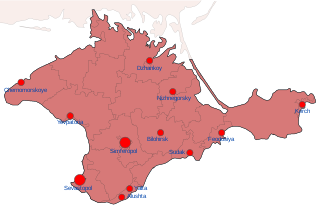
On 27 February 2014, unmarked Russian soldiers were deployed to the Crimean Peninsula in order to wrest control of it from Ukraine, starting the Russo-Ukrainian War. This military occupation, which the Ukrainian government considers to have begun on 20 February, laid the foundation for the Russian annexation of Crimea on 18 March 2014. Under Russia, the Ukrainian Autonomous Republic of Crimea was replaced by the Republic of Crimea, though the legitimacy of the latter is scarcely recognized internationally.
































